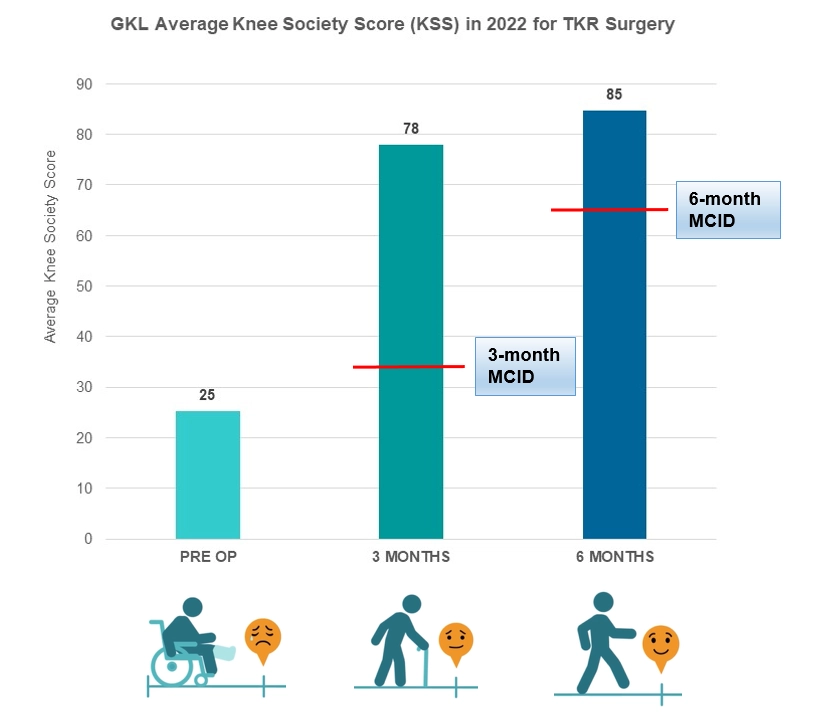
Orthopaedics, sometimes spelled orthopedics, is a medical specialty that focuses on the musculoskeletal system including bones, joints, muscles, ligaments, tendons, and nerves. Orthopaedic specialists diagnose and treat a wide range of conditions that affect mobility and function, such as bone fractures, dislocations, arthritis, sports injuries, spinal disorders, and congenital abnormalities. Treatments may involve both non-surgical methods like physiotherapy and medication, as well as advanced orthopaedic surgeries such as joint replacement or spine surgery.
At Gleneagles Hospital Kuala Lumpur, the latest technology, techniques, and procedures are used by top-notch surgeons to replace, reconstruct, and preserve your hips, knees, and shoulder joints. The multidisciplinary team of experienced orthopaedic surgeons, physiotherapists, occupational therapists, and specialised nurses works collaboratively to ensure efficient recovery and effective patient care.
Our mobility is crucial for living an enriched and fulfilled life and plays a vital role in maintaining our overall health. Injuries or disorders affecting bones, muscles, or joints, including those caused by sports injuries, trauma, or degenerative diseases, may lead to serious health complications, especially if left untreated. Gleneagles Hospital Kuala Lumpur Orthopaedic Specialist team comprises a panel of expert surgeons, physiotherapists, occupational therapists and nurses, all working together to ensure your recovery is a speedy and pleasant one.
Gleneagles Hospital Kuala Lumpur specialises in comprehensive joint replacement surgery, helping patients with significant joint damage or degeneration. Procedures offered include:
These surgeries are designed to alleviate chronic joint pain, restore function, and enhance mobility and overall quality of life.
The hospital's team of specialised orthopaedic and spine surgeons addresses a broad range of spinal conditions, including:
Careful diagnostic assessments and precision-focused surgical techniques help patients achieve significant relief from spinal pain and improved spinal function.
Gleneagles Hospital Kuala Lumpur treats a wide range of orthopaedic conditions affecting bones, joints, muscles, and connective tissues. Common conditions include:
Elbow injuries and disorders can result in pain, stiffness, and decreased functionality. Common conditions include:
Knee injuries or degenerative conditions can significantly impact mobility and daily life. Common knee conditions treated include:
Spinal conditions can cause significant pain, discomfort, and impair movement. These include:
Sports injuries often involve soft tissue damage, fractures, and joint instability. Common conditions include:
Paediatric orthopaedic conditions typically involve growth-related issues and congenital disorders. These conditions include:
Foot and ankle conditions can cause discomfort and limit mobility. These include:
Hand and wrist conditions can range from repetitive strain injuries to fractures. These include:
Tumours affecting bones or soft tissues require specialised care, including:
Shoulder conditions often involve rotator cuff injuries, instability, or arthritis. These include:
Hip conditions can cause pain and limited movement. These include:
To accurately diagnose orthopaedic conditions, a variety of advanced diagnostic tests are used to assess the health of bones, joints, muscles, and soft tissues. These tests help orthopaedic specialists determine the most effective treatment approach for each patient.
To evaluate the electrical activity and muscular response times to nerve stimulation, EMG diagnostic tests are recommended as they can help detect muscle and nerve disorders as well as those that affect their connectivity.
EMGs require the insertion of one or more electrode needles through the skin into muscle tissue in order to record electrical activity of the muscles.
Bone biopsy procedures involve extracting a small sample of bone tissue to check for abnormalities, such as cancer or infection.
Needle biopsies involve a small incision of the skin, and a needle is inserted into the bone to retrieve a sample. But fret not, as this biopsy is performed under local anesthesia.
Open biopsies, however, require a much larger incision of the skin, and a piece of bone is surgically removed instead. But relax, this procedure is performed under complete general anesthesia.
Advanced imaging methods allow for detailed assessment of the bones and soft tissues to identify fractures, degeneration, or other abnormalities.
A CT scan is a diagnostic imaging method that makes use of x-rays to digitally produce cross sectional images of one's bones, blood vessels, and soft tissues within the body.
Diagnostic Ultrasound, also known as sonography, is a non-invasive technique which makes use of high-frequency sound waves to produce digital images of structures inside the body. High resolution imaging enables our specialists to detect any tendon tears, tiny calcifications, as well as foreign bodies.
DXA procedure utilises x-rays to assess factors such as bone density when diagnosing osteoporosis. DXA is also capable of predicting an individual's level of fracture risk, which is useful for post-treatment monitoring.
As a noninvasive imaging technique, MRI utilises magnetic fields and pulses of radio waves to produce pictures of bones as well as soft tissues. Because the MRI doesn't use x-rays, it currently has no known side effects. The MRI can also be used to effectively diagnose and assess a wide array of medical conditions that affect soft tissues.
Similar to the MRI, MRA produces much better images due to a contrast solution (gadolinium) being injected into the affected joint, which allows its structures and soft tissues to be highlighted, revealing tears and defects. The MRA is usually used to determine joint conditions and can efficiently detect any ligament, tendon as well as cartilage related diseases.
A PET scan is a medical imaging procedure that provides more detailed information on organ functions or systems in the body. PET Images provide the specialist with physiological information regarding the bone and is mainly used to detect issues such as abnormal bone growth associated with tumours or other abnormalities.
At Gleneagles Hospital Kuala Lumpur, clinical excellence is at the heart of everything we do. The team of orthopaedic specialists is committed to providing the highest standard of care, using the latest advancements in orthopaedic surgery, spine surgery, and trauma management to ensure the best possible outcomes for patients.
Knee surgery, particularly Total Knee Replacement (TKR), is a complex procedure, especially for those suffering from knee osteoarthritis. At Gleneagles Hospital Kuala Lumpur, we recognise the challenges and prioritise the patient's voice in our approach to outcomes. We meticulously evaluate each TKR surgery at 3-month and 6-month intervals, utilising the Knee Society Score (KSS) to measure and compare results against Minimal Clinically Important Difference (MCID) and Substantial Targets.
This precision-driven approach ensures that the impact of TKR transcends the surgical realm, resulting in significant improvements in both quality of life and mobility. This exemplifies our commitment to comprehensive and transformative orthopaedic care.
The patient visits the doctor to determine if TKR is recommended. | The patient is referred for same-day pre-operative physiotherapy. | PROMs (KSS) survey and pre-operative physiotherapy are conducted for the patient in rehab. | The patient undergoes surgery in GKL. | Physiotherapy is administered to the patient throughout their admission, from the time of admission until discharge. | The patient attends physiotherapy sessions for three months. *3 months post-surgery PROMs (KSS) survey is conducted again to assess the patient's progress. | The patient continues physiotherapy sessions for an additional three months. *6 months post-surgery PROMs (KSS) survey is conducted to monitor the patient's progress. |
Through our Patient Reported Outcome Measures (PROMs) Survey, we carefully measure our patient’s perception of health and functional well-being post-TKR surgery. PROMs are standardized questionnaires completed by patients, providing insights into health perception and functional well-being. The hospital conducts these surveys before and after treatment to understand any changes in the patient’s condition and quality of life. Working closely with patients and clinicians, PROMs give us a full picture of our patients' health and identify opportunities for continuous improvement.
When it comes to knee surgery, Gleneagles Hospital Kuala Lumpur uses a benchmark called Minimal Clinically Important Difference (MCID). Our aim is for patients to see a minimum score increase of 9 points at 3 months and 40 points at 6 months post-surgery.
One notable achievement is reaching a 100% rate in the MCID benchmark within 3 and 6 months post-surgery, underscoring substantial improvements in pain reduction, daily function, and overall quality of life.

KSS Reference:
2011 Knee Society Scoring System© (2011KSS)
The Knee Society (https://www.kneesociety.org/the-knee-society-score)
MCID Reference:
Van der Wees, P.J., Wammes, J.J.G., Akkermans, R.P. et al. Patient-reported health outcomes after total hip and knee surgery in a Dutch University Hospital Setting: results of twenty years clinical registry. BMC Musculoskelet Disord 18, 97 (2017). https://doi.org/10.1186/s12891-017-1455-y
Lizaur-Utrilla, A., Gonzalez-Parreño, S., Martinez-Mendez, D. et al. Minimal clinically important differences and substantial clinical benefits for Knee Society Scores. Knee Surg Sports Traumatol Arthrosc 28, 1473–1478 (2020). https://doi.org/10.1007/s00167-019-05543-x
https://d-nb.info/1212656903/34
Anterior Cruciate Ligament Reconstruction (ACLR) is a surgical intervention aimed at replacing a damaged ligament, requiring a delicate blend of precision and excellence. At Gleneagles Hospital Kuala Lumpur, our commitment extends beyond technical proficiency to encompass stringent adherence to quality indicators.
Our 2023 performance statistics not only reflect exceptional results but also demonstrate our unwavering focus on patient safety. By surpassing international benchmarks in key areas such as prophylactic antibiotic administration, blood transfusion rates, complications, readmission prevention, and post-operative rehabilitation, we continuously strive to assure our patients of a level of care that goes above and beyond established standards.
The patient visits the doctor to determine if ACLR is recommended. | The patient is referred for same-day pre-operative physiotherapy. | PROMs (KSS) survey and pre-operative physiotherapy are conducted for the patient in rehab. | The patient undergoes surgery in GKL | Physiotherapy is administered to the patient during admission until discharge. | The patient attends physiotherapy sessions for three months. *3 months post-surgery PROMs (KSS) survey is conducted again to assess the patient's progress. | The patient continues physiotherapy sessions for an additional three months. *6 months post-surgery PROMs (KSS) survey is conducted to monitor the patient's progress. |

ACLR International Benchmark Reference:
At Gleneagles Hospital Kuala Lumpur, the team of experienced orthopaedic specialists is dedicated to providing personalised treatments for your musculoskeletal health. Whether you need a joint replacement, spine surgery, or care for sports injuries, we offer the latest technologies and compassionate care to help you recover and get back to doing what you love. Contact us today to schedule a consultation and take the first step towards a pain-free life.
Meet the experienced team of orthopaedic specialists at Gleneagles Hospital Kuala Lumpur. Each expert brings advanced knowledge and specialised skills to deliver comprehensive care for a wide range of musculoskeletal conditions. Whether you require joint replacement, spine surgery, or treatment for sports injuries, these specialists are dedicated to delivering the highest standard of care to help you recover and regain your mobility.


Wait a minute

Wait a minute